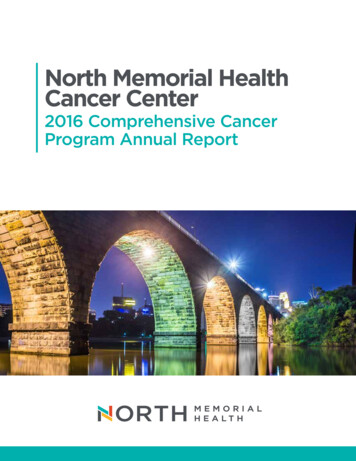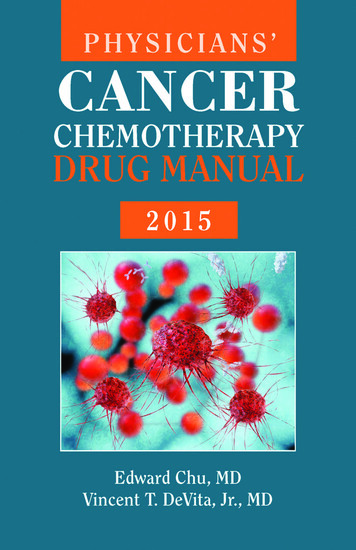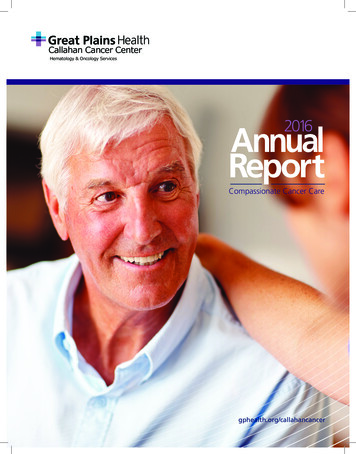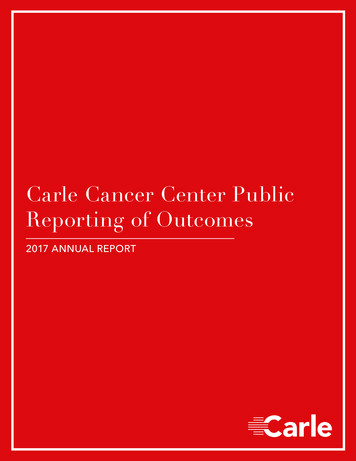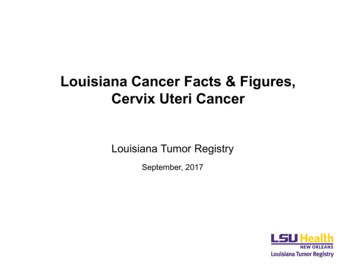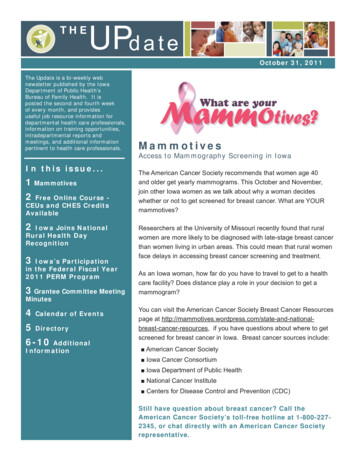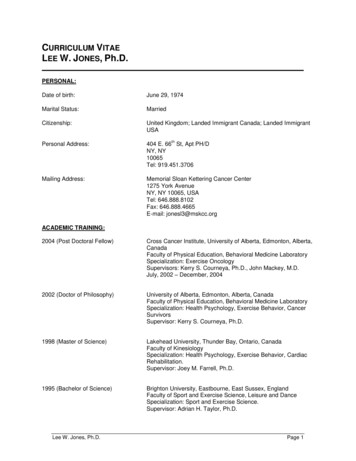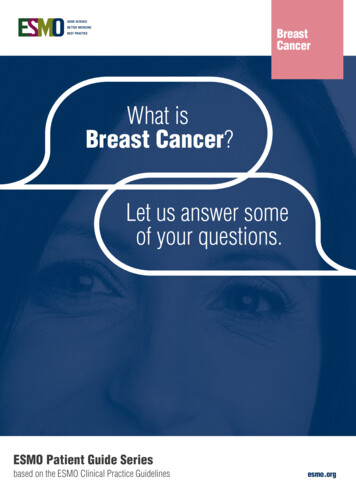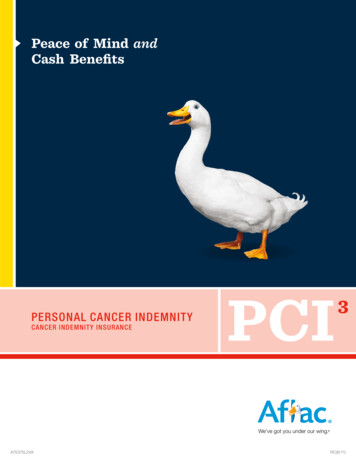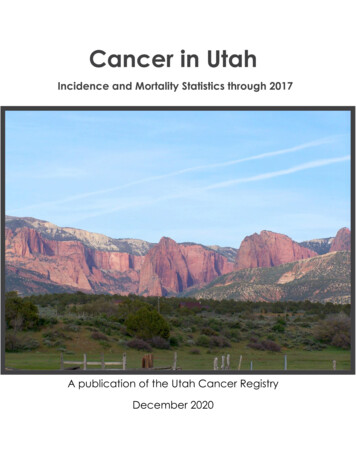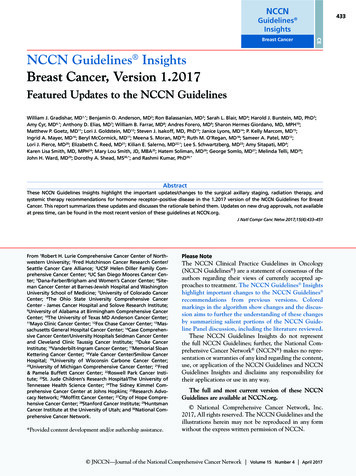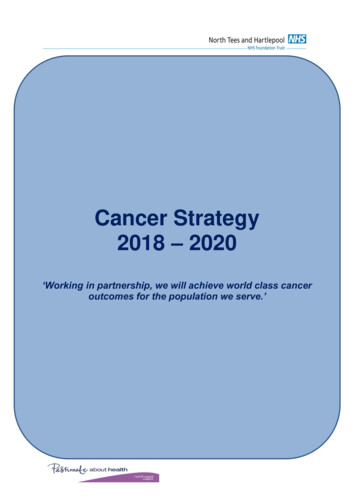
Transcription
Cancer Strategy2018 – 2020‘Working in partnership, we will achieve world class canceroutcomes for the population we serve.’
ContentsPreface1. Introduction42. Aims and Objectives63. Prevention74. Diagnosing Cancer Earlier85. Ensuring Better Treatment116. Living with and Beyond Cancer167. Reducing Inequality198. Delivering Care in the Most Appropriate Setting209. Building for the Future2110. Information and Outcomes2211. Cancer Management and Leadership2412. Research262
PrefaceEach year over 280,000 individuals in England are diagnosed with cancer a figure which isgrowing by around 2% per annum. Around 130,000 still die from the disease each year andthis figure has remained relatively constant as the incidence has increased. Currently anestimated 2 million people are living in England who have had a cancer diagnosis and this isexpected to rise to 3.4 million by 2030. Almost everyone will know someone who has hadcancer and surveys show that people fear cancer more than anything else.In 2000 the NHS Cancer Plan was published which set out a ten-year national strategy toreorganise, standardise and rejuvenate cancer services to compare with the best in Europe.In 2007 the Cancer Reform Strategy was published which built on the progress made sincethe publication of the NHS Cancer Plan (2000) and set a clear direction for cancer servicesuntil 2012 and beyond. Achieving World Class Cancer Outcomes – a Strategy for England2015-2020 was published in July 2015 by an Independent Task Force which includes a seriesof initiatives, across the cancer patient pathway, to be taken forward over the next five years.In May 2016 an implementation plan to support the delivery of the cancer strategy waspublished. The national strategy emphasises the importance of earlier diagnosis and livingwith and beyond cancer to deliver outcomes important to patients.There has been considerable progress made on cancer over the past fifteen years. Cancermortality has fallen, survival rates in this country have never been higher and patients’experience of their care has improved. Progress has also been made against smoking,detecting more cancers early through screening and delivering faster diagnosis and treatment.Multi-disciplinary teams now provide more co-ordinated and higher quality care for patients.Whilst there may be much to celebrate since the first NHS Cancer Plan was published in 2000,there remains much more to do.The Department of Health in ‘Improving Outcomes: A Strategy for Cancer 2011’ made apledge to set the following challenges; Reduce the incidence of cancers which are preventableImprove access to screening and introduce new screening programmes where evidenceexistsAchieve earlier diagnosis of cancerEnsure all patients have equal access to the best possible treatmentAchieving World Class Cancer Outcomes – a Strategy for England (2015), developed by anIndependent Cancer Taskforce, further builds on these pledges and makes ninety six (96)recommendations of which six key priorities were identified for the next five years: Spearhead a radical upgrade in prevention and public health,Drive a national ambition to achieve earlier diagnosisEstablish patient experience as being on par with clinical effectiveness and safetyTransform our approach to support people living with and beyond cancerMake the necessary investments required to deliver a modern high quality serviceOverhaul the process for commissioning, accountability and provisionWhilst a number of the priorities are aimed at national policy makers and beyond the gift ofthe Trust, threaded throughout the strategy are these pledges and recommendations.We are committed to continuously improving cancer care and commend this strategy to you.3
1.IntroductionNorth Tees & Hartlepool NHS Foundation Trust (referred to as the Trust) provides health careservices to a population of 400,000 people predominantly covering an area from Easington inthe North, Stockton in the South, Hartlepool in the East and parts of Sedgefield in the West.The Trust is a designated Cancer Unit which provides secondary care cancer services forcommon cancers to the local adult population. The Trust also hosts the Screening Centres forbreast and bowel cancer, provides the Cervical Screening Pathology Services and complieswith the Screening Quality Assurance Service (SQAS) (formally known as QualityAccreditation Review Committee (QARC)) requirements for Screening Programmes. Due tothe advent of patient choice and as a provider of National Breast and Bowel ScreeningProgrammes, services are provided to wider populations including Teesside and SouthDurham.The Trust provides a wide range of health services covering general Acute and Communityhospital services including Outreach facilities in local community settings. The Trust currentlydelivers services from two major hospital sites: the University Hospital of North Tees and theUniversity Hospital of Hartlepool.The Integrated Care Systems (ICS) offer the opportunity for the Trust to work in partnershipacross the local health communities to ensure that a focus on improving outcomes for peoplewith cancer is embedded firmly in the context of improving outcomes for the whole population.New models of cost effective care which meet the needs of patients across the whole patientpathway are being developed as part of the overarching transformation programme. Thesemodels must be fully integrated, be of the highest clinical governance standard and be coordinated between service providers.1.1North Tees and Hartlepool Cancer ServicesNorth Tees & Hartlepool NHS Foundation Trust provides cancer services in alignment withthe Trust’s overall strategic direction, values and aims.The Trust has made significant improvements in cancer services over several years, both indeveloping services and improving access to cancer services across the organisation.The Trust’s overall cancer vision is to ensure the delivery of first class cancer services, asoutlined below;Cancer Vision / Mission Statement - “First Class Cancer Services”Patient centred care Best possible outcome and service quality First choice for patients and their families Support innovation, efficiency and productivityThe Trust’s Cancer Services Department has key relationships with: Northern Cancer Alliance Northern England Clinical Networks Tees-wide Locality Cancer Centres in South Tees NHS Foundation Trust and Newcastle NHS FoundationTrust Local Hospices Service Users and Carers4
Voluntary SectorMacmillan Cancer Support5
2.Aims and objectivesAchieving World Class Cancer Outcomes – a Strategy for England (2015) further builds onprogress since the publication of the NHS Cancer Plan (2000) and the Cancer ReformStrategy (2007) Whilst acknowledging success in delivering cancer strategy depends onmultiple factors including partnership working, new models of care, intelligent use of data, todrive continuous improvement.The six priority areas within the document are: Spearhead a radical upgrade in prevention and public healthDrive a national ambition to achieve earlier diagnosisEstablish patient experience as being on par with clinical effectiveness and safetyTransform our approach to support people living with and beyond cancerMake the necessary investments required to deliver a modern high quality serviceOverhaul the process for commissioning, accountability and provisionThe aim of the Trust’s Cancer Strategy document is to implement the national cancer strategyby: Providing a basis on which to build a vision for the future of local cancer services to deliverobjectives as set out in the Cancer Reform Strategy and Achieving World Class CancerOutcomes. Demonstrating the commitment of the Trust to involve service users in developing cancerservices. Setting out the Trust’s priorities, aligned to national policy and local plans, for deliveringcancer services over the next three to five years. Clarifying the role of the departments in delivering cancer service priorities. Offering assurance that the necessary planning, performance management and riskmanagement processes are in place to deliver patient quality and safety.6
3.PreventionCancer Strategy IntentTo contribute to cancer health promotion activities through awareness raising with patients,their families and carers.Work in collaboration with primary care to fully utilise opportunities such as community andsocial care contacts.An estimated 4 in 10 cases of cancer could be prevented largely through modification oflifestyles. The main risk factors for causes of cancer are outlined in the Achieving World ClassCancer Outcomes – A Cancer Strategy for England: TobaccoAlcohol ConsumptionObesity, diet and physical activityExposure to UVOther exposures such as air pollution, occupational risks, infections (including HumanPapilloma Virus (HPV) and radiation.The Trust actively participates in the National Health Promotion Awareness Campaignsincluding Promoting Smoking Cessation, Alcohol Awareness, Healthy Lifestyles andExcessive Exposure to Sun and Sun Beds. Examples of health awareness initiatives include; Supporting the Northern Cancer Alliance as well as the Tees-wide Locality PreventionInitiatives, such as ‘Be Clear on Cancer Campaigns’. Being part of the NHS Smoke Free Pledge as part of a national programme to help thewhole NHS go smokefree. School Nurses regularly promoting health awareness throughout the schools withinNorth Tees and Hartlepool.The Trusts adopts the philosophy that each contact with a patient, either in community orwithin the Trust, is a health promotion or health prevention contact. Following a review of theTrusts Outpatient Department, part of the transformational action is to provide further healthpromotion activities within the outpatient setting.7
4.Diagnosing Cancer EarlierCancer Strategy IntentTo continue to host the established screening centres for breast and bowel cancers in theTrust and to provide streamlined pathways with good links to relevant MDTs.To continue to explore possible new screening interventions as recommended nationally.To support and be responsive to the introduction of National Screening Programmes anddiagnosing cancer awareness Initiatives.To continue to support and be responsive to “Be Clear on Cancer” awareness campaigns.To support and be responsive to National Diagnostic Cancer Fund initiatives to improvediagnostic capacity.To manage capacity and demand for diagnostic services in relation to cancer diagnosis.To support and be responsive to the introduction of the 28 Day Faster Diagnosis Standard.To seek the development of Rapid Diagnostic and Assessment Centres.To contribute to awareness raising through Network Site Specific Group (NSSG) activities andthe Multi-Disciplinary Teams.To provide feedback to primary care on the appropriateness of two week rule referrals.Ensure participation in National Institute for Health Research (NIHR) screening clinical trialsto enable patients to have early access to such programmes.Generally, it is agreed that later diagnosis has been a major factor in the poor survival ratesin England compared with other countries in Northern and Western Europe. Much of the focusof current work is to achieve earlier diagnosis, to do this the Trust will: Ensure access to high quality screening programmes where there is evidence that thesesave lives (breast, cervical and bowel cancers). Work collaboratively with primary care to raise patient awareness at point of referral. Facilitate earlier diagnosis in primary care, by eliminating delays and providing Primarycare with better access to diagnostic tests. Promote awareness and early presentation, especially among those groups in societymost likely to delay seeking advice. Identify areas within the diagnostic pathway to increase capacity and enable rapid accessto key diagnostic tests, developing outline business cases to enable the Trust to be in aposition to actively compete for funds from national funds.8
4.1ScreeningThere are three National Screening Programmes established for breast, bowel and cervicalcancers. It should be acknowledged that the bowel and cervical screening programmes arealso prevention programmes identifying pre malignant changes enabling treatment to preventthe development of bowel and cervical cancers. The Trust hosts the Breast and BowelScreening Centre for Teesside and South Durham and the Cervical Screening pathologyservice for Teesside. The Trust will continue to support and participate in all three screeningprogrammes for the local population. The Trust strives to ensure that all screeningprogrammes fulfil Screening Quality Assurance Service (SQAS) requirements with local MDTsworking closely alongside Screening Centres to provide streamlined pathways, and timelytreatment.From 2018, NHS England will be introducing a new bowel cancer screening test for over 4million people that is easier to use than the current test. The faecal immunochemical test forhaemoglobin (FIT) will replace the faecal occult blood test (FOBt) and is expected to increasethe take up of bowel cancer screening by around 7%.Bowel cancer is the fourth most commoncancer in the UK. If it is detected at an early stage, before symptoms even appear, it is easierto treat and there is a better chance of survival. With up to a third-of-a-million more peopleexpected to self-administer the FIT test, it will increase the number of early-stage bowelcancers that are detected.From April 2019 a new cervical cancer screening programme will be introduced. More than99% of cervical cancers are caused by Human papilloma virus (HPV). The introduction ofprimary HPV testing for cervical cancer will see more than three million women a year testedand could prevent around 600 cancers a year.Evidence relating to possible new screening interventions is constantly evolving as new testsare developed and clinical studies are undertaken. The Trust will review and actively explorethe possibility of participating in newly emerging screening programmes, further building onour expertise of hosting screening services within the Trust.4.2Raising Public AwarenessThe Trust endeavours to continually raise public awareness of cancer symptoms, encouragingpeople to seek help early and promote early diagnosis in primary care by working incollaboration with colleagues.The Trust will contribute to the provision of specialist knowledge in awareness raising,development of guidelines through the Northern Cancer Alliance, North of England StrategicClinical Networks (NESCN) Network Site Specific Groups (NSSGs) and through the CancerPatient and Carer Group and scrutiny forums. The Trust will continue to be actively involvedwith the Cancer Alliance for the region, in raising public awareness.4.3Facilitate Earlier Diagnosis in Primary CareThe Trust has a well established two week referral process with streamlined pathways to allcancer types treated in the Trust. The Trust plans to maintain; Adherence to national guidelines for two week referralsReferrals by pre-agreed proformas with Primary CareReferrals to a Central Booking Office in the Trust9
Direct booking on the E-Referral System for all two week referralsProvide patients with choice in their appointmentStreamline pathways of care by specialist MDTsAccess to diagnostics.The Trust will maintain rapid primary care access to specialist diagnostic services withspecialist trained staff including Radiology, Endoscopy and Pathology. Further developmentof ‘One Stop’ services will be considered where appropriate.4.428 Day Faster Diagnosis StandardA new cancer diagnosis standard, designed to ensure that patients find out within 28 dayswhether or not they have cancer, will be introduced in 2020.To prepare for the future 28-day standard, NHS England recently introduced a new CancerWaiting Times System (April 2018) which has been implemented within the Trust replacingthe National ‘Open Exeter’ cancer waiting times system. Data is currently being collected andmonitored within the Trust in preparation for data collection for all patients starting in 2019,and full monitoring against the standard from April 2020.10
5.Ensuring better treatmentCancer Strategy IntentTo ensure the Trust consolidates and continues to develop as a specialist treatment providerfor adult cancers.Ensure that the requirements of the National Cancer Action Team document “Characteristicsof an Effective MDT” (DOH 2010) are implemented and all MDTs in the Trust are fit forpurpose, including those that Trust personnel are members of in partner organisations.To support and be responsive to the 10 recommendations of the National MDT EffectivenessTask and Finish GroupTo ensure equitable access to supportive and palliative care along the patient pathway.The Trust will consider were appropriate, cost effective and enhancement to patient care,investment in new technologies to further develop market share in specialist treatments.To ensure equitable access to specialist cancer nurses, and allied health professionals,including Psychology for all patients along each tumour pathway as per the requirement ofImproving Outcomes Guidance (IOGs) and National Best Practice. This will be an on-goingrolling programme.To continually review the patient pathways to ensure they are patient focussed and supportthe achievement of the cancer access targets.Clinical teams will be supported to develop multi professional collaborative working across theorganisation to provide leading edge surgical cancer treatment for patients.To ensure all MDTs and cross cutting teams participate in the Quality Surveillance Programmeand are supported to do so.Over the last 10 years the Trust has made great efforts to ensure timely and high quality carefor cancer patients. A number of drivers for ensuring better treatment have been introducednationally, at Network and local level. These include; Full implementation of Improving Outcomes Guidance Unification of MDTs across sites with the refurbishment and modernisation of the TrustMDT rooms Improvement in meeting Quality Surveillance Programme Quality Measures Going further on cancer waiting times Expanding training in Laparoscopic techniques and other surgical innovations Repatriation of Chemotherapy patients and improvement in delivery of chemotherapy inline with National and Network Guidance The development of the Acute Oncology team in line with the recommendations of theNational Chemotherapy Advisory Group (NCAG) Report (2008) within the Trust. Timely evaluation of new cancer drugs The introduction of new innovations in cancer treatment11
5.1Designated Treatment Hospital for Teenage and Young Adults (TYA)Cancer Services Outcomes Dataset (CSOD)Surveillance monitoring in Prostate cancerThe clinical leadership and involvement on the Northern Cancer Alliance, NSSGs, clinicalgroups and Northern Cancer Alliance Chemotherapy Group will continue to be supportedand reflected in job plans.Service DevelopmentsOne of the Trusts Strategic aims is to improve and grow its healthcare services to better meetthe needs of its patients, commissioners and the Trust.The Trust is proud of its achievements in the development of new and innovative techniquesand procedures. Laparoscopic surgical techniques have been implemented within the Trustfor several years within colorectal surgery for both elective and emergency admissions andthe colorectal team also offers Trans-anal Endoscopic Micro Surgery (TEMS). The ColorectalTeam host service improvement courses in Colorectal Laproscopic Surgery. Laparoscopictechniques have been introduced and developed within other tumour groups includingGynaecology and Urology. Expertise in the provision of laparoscopic surgical techniques willbe maintained and expanded. The Trust will be actively involved in strategic discussionsregarding further centralisation of cancer surgery, particularly those tumour groups wheresome designated surgery takes place within the Trust for example urological andgynaecological cancers.A number of actions have been implemented with operational and clinical accountabilitystrengthened, the tracking system reviewed, internal escalation processes embedded andcapacity and demand reviews. H o w e v e r t h e T r u s t continues to experience pressureswith regards to delivery of the national cancer standards. As such, it was recognised thatperformance against such standards required robust governance and monitoring, a focusedExecutive Led Cancer Recovery Group has been established and further servicedevelopments implemented including: Daily vetting of all Lung Cancer two week rule referrals. Optimal Lung Pathway Implemented - Direct to Test (chest x-ray), if abnormal patient sentstraight for CT scan and clinic appointment same day. Patients now able to have TRUS/biopsy under heavy sedation within Radiology rather thanhaving a GA within Theatre Endoscopists now requesting a CT scan directly after endoscopy procedure for thosepatients on the Upper GI pathway, for those with negative results and experiencing weightloss. Hysteroscopy procedures moved from day case theatres to the Outpatient setting,releasing theatre capacity. Colorectal patients now able to leave clinic with an endoscopy appointment. Opening of a Cancer Information Centre at the University Hospital of North Tees with asatellite centre at the University Hospital of Hartlepool to enable patients, carers and healthcare professionals to access robust cancer information and benefits advice.12
5.2Multidisciplinary Team Working (MDT)The National Institute for Clinical Excellence (NICE) have published Improving OutcomesGuidance (IOG) for each tumour group. These recommend, through Cancer Networks,configuration of cancer diagnostics, treatment pathways and MDT membership to improveclinical outcomes. As a Cancer Unit the Trust provides treatment for common cancers in linewith IOG Guidance. The local MDTs work closely with centre MDTs at South Tees HospitalsNHS Foundation Trust and The Newcastle Upon Tyne Hospitals NHS Foundation Trust asprescribed by service configuration in NICE and Network guidance.There are ten (10) cancer MDTs established within the Trust, eight (8) of which are cancerunit MDTs (Appendix 1). The Trust hosts the Teeswide Breast MDT discussing patients withbreast cancer from across Teesside by a single unified MDT. The Trust also hosts the T1Rectal Cancer Local Excision MDT for the southern part of the Network. The Trust will continueto support all MDTs, and local MDTs will continue to work with specialist centre MDTs toensure streamlined pathways and timely discussion in centre MDTs in line with NICEGuidance. The Trust has good compliance with core membership and cover associated forMDTs, identified within the IOG documents and will continue to strive to achieve emergingQuality Surveillance Programme measures, particularly in relation to the MDT attendancebeing quorate. The Trust will continue working in collaboration with South Tees HospitalsNHS Foundation Trust and the Clinical Commissioning Groups (CCGs) to ensure adequateOncology cover.5.3MDT EffectivenessIn 2016 it was recognised that there was a need to redefine the role and function of theMDT meeting to reflect the current environment in which MDTs work and keep up with thechanges in oncology practice whilst maintaining the many benefits and continuing to meetpatients’ expectations.The perceived value of multidisciplinary decision making was that they arrived at the mostappropriate clinical management recommendation taking into account not only the bestevidence but also patient preference thus providing a holistic approach to the process.The reality of MDT functioning has however taught us that while the MDT meeting is wellplaced to make technical recommendations, the absence of the patient from thediscussion despite representation of patient’s views provided by advocates such asClinical Nurse Specialists (CNS) means that holistic recommendations are difficult toachieve. In addition the increasing burden of the rising number, duration and complexityof MDT meetings means that frontline clinical staff spend increasing amounts of time inmeetings with an inevitable impact on reducing time for direct patient contact. The qualityof discussion around each clinical case is also often impacted upon by shortage ofavailable time.In these days of precision medicine and patient centered care, where managementdecisions are driven by patient and tumour specific biomarkers, it is ultimately the patients’personal wishes and aspirations that should be the primary determinant of themanagement choice within a range of clinically appropriate treatment options. Thisrequires more time for direct patient contact which is in apparent conflict with the risingdemands of the MDT.There is therefore a need to rebalance the MDT meeting process and this can be achievedby streamlining the functioning of the MDT meeting allowing more time for individual13
patient contact. This should be achievable without risk to the principles of multidisciplinaryworking which remain at the core of technical decision making and patient management.The Trust will continue to support and be responsive to the recommendations of theNational MDT Effectiveness Task and Finish Group by ensuring membership on theNorthern Cancer Alliance MDT Effectiveness Group and driving implementation of therecommendations within the Trust.5.4Pathway DevelopmentWorking in partnership with neighbouring providers, the Trust will collaborate on reviewingpatient pathways to ensure that communication between professional and information flowsare timely and robust to facilitate continuity of care.The clinical teams have developed streamlined pathways in line with National/Regionalguidance for the benefit of the patients. Further work is required to build capacity in diagnosticand surgical areas to sustain this achievement. The Trust will continue to work on achievingall access targets as outlined by Going Further on Cancer Waits (GFoCW).Drug treatments for cancer have developed substantially with combination Drug Therapies,Hormonal Therapies and New Generation Anti-cancer treatments targeted at MolecularAbnormalities. The Trust follows all NICE recommendations for drug therapy and will continueinvolvement at a regional level for participation in the NESCN Chemotherapy Group). Theclinical representatives on this group will be supported to continue this leadership andinvolvement.The Pharmacy department offers an integral and essential service in the support and deliveryof Cancer Therapy Provision. The Trust will continue to review and assess the demands onthis service to ensure capacity meets demand in ever increasing delivery of cancer treatments.5.5National Cancer AuditsMultidisciplinary teams are contributing to nationally designated clinical audits relating todifferent cancers. These are; National Lung Cancer Audit (LUCADA)National Colorectal Cancer Audit (NBOCAP),National Head and Neck Cancer Audit (DAHNO),National Oesophago-gastric Cancer AuditNational Breast Cancer Audit (BASO)National Prostate Cancer AuditNephrectomy Audit (BAUS)Breast Cancer Clinical Outcome Measures (BCCOM),The Trust recognises there is a need to build on the current clinical audit activity within theTrust to support cancer. Clinical teams from the Trust participate in National ComparativeAudits and in recent years the quality of the data collected and submitted has improvedbecause of collaborative working with Central Cancer Service Teams and the clinical teams.As highlighted in the Achieving World Class Cancer Outcomes – A Strategy for Englanddocument, there is a need to further develop and roll out Clinical Audit for cancer. This isexpanded further in the section of information.14
15
6. Living With and Beyond CancerCancer Strategy IntentTo maintain the Cancer Patient Information and Support Centre within the Trust incollaboration with partner organisations.To systematically implement Cancer Survivor Initiatives within the Trust, including keyelements of the Recovery Package and Stratified Follow-up Pathways.To ensure equitable access to a Specialist Cancer Nurse for all cancer patients.Working with partner organisations within the Region to access approved training for clinicalteam members.To support and contribute to the locality and regional groups for Supportive and PalliativeCare.To continue to support patients and carers involvement in service and pathway design, andcontinue to support patient surveys and help in implementing actions from these surveys.Incidence and survival rates for cancer are improving which means the number of people livingwith cancer is growing considerably, however many patients are left with physical andpsychological effects from diagnosis and treatment. Achieving World Class Cancer Outcomes– A Strategy for England recommends that transformation is needed in the approach tosupport people living with and beyond cancer.Throughout the care pathway, patients and carers need access to high quality information andsupport, psychological support and co-ordination and continuity of care, provided byprofessionals who have competencies in face to face communication to empower patients sothey can take an active role in decisions about their care and treatment including place oftreatment.Following the closure of the George Hardwick Information Centre within the Trust, a significantgap for patients, carers and professionals gaining equitable access to robust, high qualityinformation emerged. In partnership with Macmillan Cancer Support a Cancer Information andSupport Centre was opened in June 2016 and there is a strategic intent to maintain anddevelop this facility within the Trust. This will continue to provide a central point of contact forpatients and carers for survivorship, information and benefits advice.The Cancer Informatio
School Nurses regularly promoting health awareness throughout the schools within North Tees and Hartlepool. The Trusts adopts the philosophy that each contact with a patient, either in community or within the Trust, is a health promotion or health prevention contact. Following a review of the
